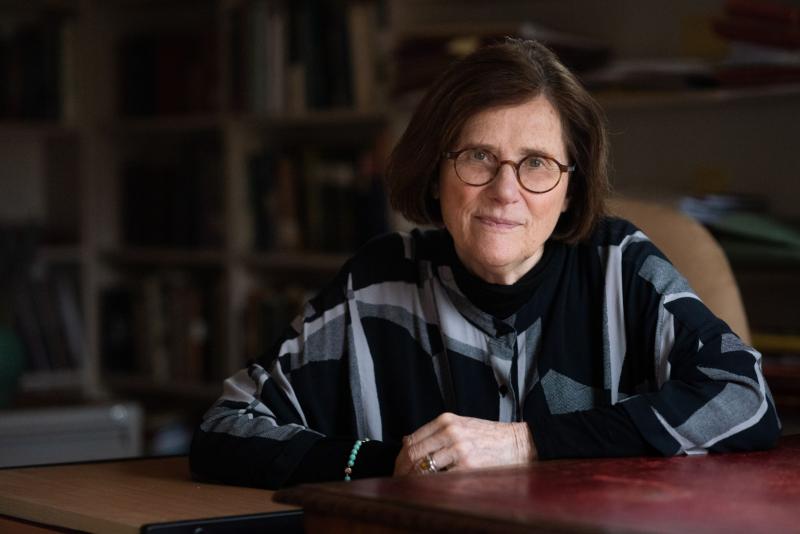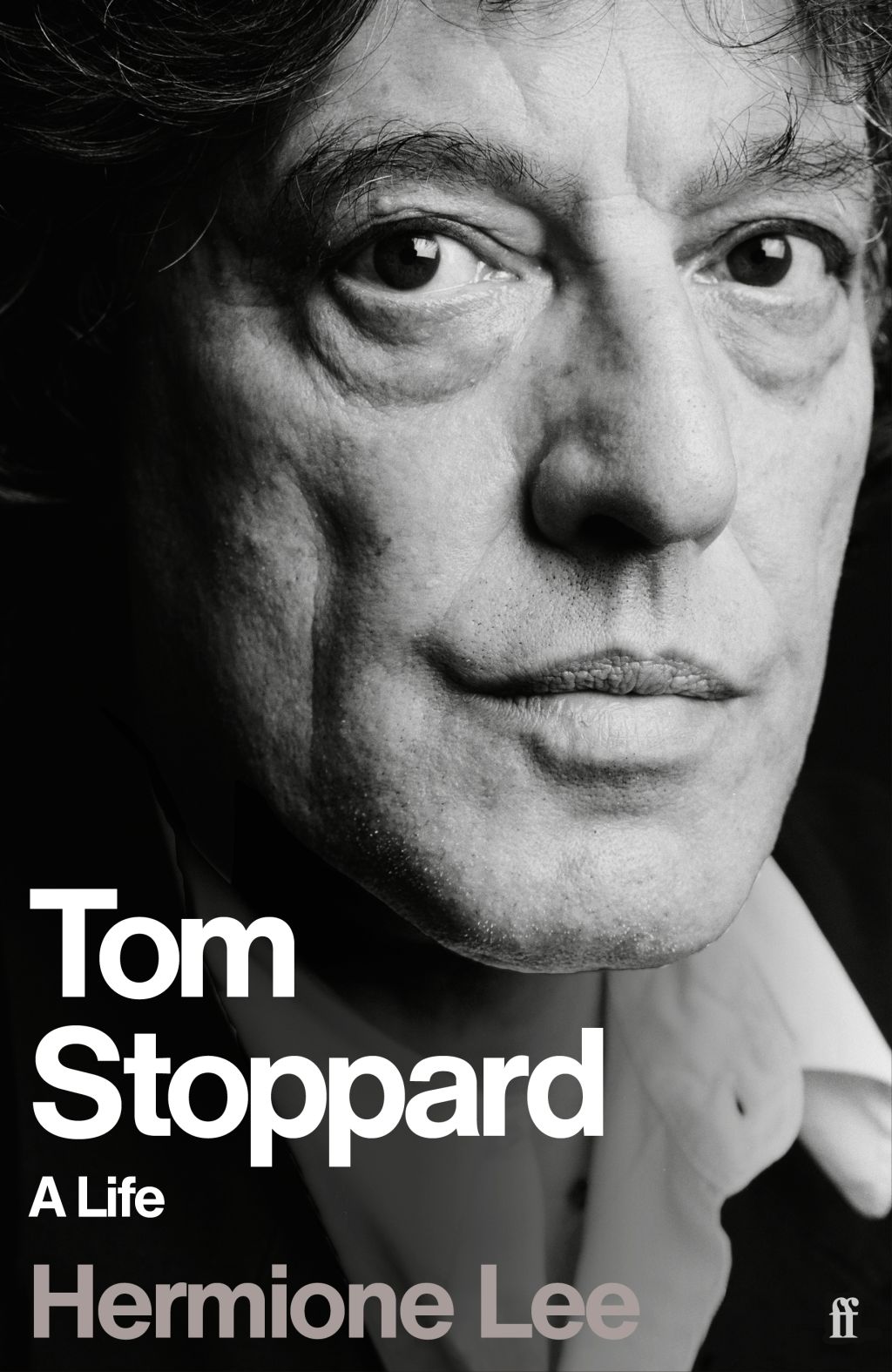Hermione Lee: Tom Stoppard, A Life review - the last word on a theatrical wordsmith | reviews, news & interviews
Hermione Lee: Tom Stoppard, A Life review - the last word on a theatrical wordsmith
Hermione Lee: Tom Stoppard, A Life review - the last word on a theatrical wordsmith
Capacious biography pins down an elusive subject

"The older he got, the less he cared about self-concealment," or so it is said of Sir Tom Stoppard, somewhere deep into the 865 pages of Tom Stoppard: A Life, Hermione Lee's capacious (to put it mildly) biography of the British theatre's leading wordsmith.
The difference here is that Lee is focusing on a literary celebrity, now 83, whose output itself spans a vast philosophical and emotional spectrum. The playwright collaborated fully with Lee on this book, and who can blame him? Someone was bound to return to the Stoppard well - a comparable 2001 biography, Ira Nadel's Double Act, had the ancillary title, A Life of Tom Stoppard - but Lee's tome immediately announces itself as the life of Tom Stoppard, and one trawl through it really isn't sufficient to absorb fully all the information and exegesis contained therein. (Alex Jennings has been reading excerpts on Radio 4.)
 Different people will draw different things from Lee's expansive approach to her subject. Baffled by the plot of Arcadia? Stoppard's 1993 masterwork - a National Theatre press night that induced a giddiness I shan't soon forget - merits a full chapter so that you too can follow along with the precocious if doomed Thomasina as she articulates a mathematical way of thinking that wouldn't come properly into play until a century later. Pretty much every Stoppard text, well-known or not, receives some sort of mention and analysis, including A Separate Peace, the esoteric TV drama that got a rare airing at the start of lockdown in a virtual production whose cast included Ed Stoppard, one of the author's four sons.
Different people will draw different things from Lee's expansive approach to her subject. Baffled by the plot of Arcadia? Stoppard's 1993 masterwork - a National Theatre press night that induced a giddiness I shan't soon forget - merits a full chapter so that you too can follow along with the precocious if doomed Thomasina as she articulates a mathematical way of thinking that wouldn't come properly into play until a century later. Pretty much every Stoppard text, well-known or not, receives some sort of mention and analysis, including A Separate Peace, the esoteric TV drama that got a rare airing at the start of lockdown in a virtual production whose cast included Ed Stoppard, one of the author's four sons.
Then there's the background. Born in Zlin, Czechoslovakia, as Tomáš (or Tomik) Straussler, Stoppard journeyed westward via a circuitous route that would itself, one feels, make a fascinating film, taking in the death of his father at sea in 1942 and sojourns in Singapore and India before finding a safe haven in a country where he learned from age 8 to wear Englishness like a well-fitting coat.
You want romance or the whiff of scandal? Lee doesn't disappoint as she tallies a sequence of lovers that puts ironic paid to Stoppard's remark, during the Broadway opening of his adultery-themed play The Real Thing, that "I very very rarely run off with an actress". One wonders how that remark has resonated with the playwright over time given that he would in due course have an extended liaison with Sinead Cusack, the actress-wife of that play's brilliant leading man, Jeremy Irons. Their affair came to an end when Cusack diverted her attentions to the discovery of a son, now grown, to whom she had given birth well before her two sons with Irons. (As happened previously with Felicity Kendal, Stoppard's onetime muse and an avowed inspiration in the writing of both Arcadia and Indian Ink, Cusack ended up leading a Stoppard premiere, in her case Rock 'n' Roll.)
Add to those discussions a recap of his actual marriages, first to a onetime housemate, Jose Ingle, who on this evidence is on hand to substitute for the real love of the young Stoppard's dreams, Isabel Dunjohn, and from there to Dr Miriam, whose fame is amusingly reported to have eclipsed her husband's, at least when it came to making a particular restaurant booking. That takes us up to his present marriage to Sabrina Guinness, 18 years his junior, an acquaintance since the 1990s who had early on assumed that the playwright was "entirely out of her reach".
Nothing much seems beyond the reach of Lee, the onetime biographer of such diverse folk as Edith Wharton and Virginia Woolf who brings a near-fetishistic sense of detail here to the architectural intricacies of Stoppard's many and varied homes, not to mention a report on the bedsprings on which the young Tommy (as his mother used to call him) slept at boarding school. As a lifelong admirer, and more, of Stoppard's blazing career in New York, where The Real Thing, Hapgood, and, especially, The Invention of Love were all improved by fresh iterations and outside eyes, I wish the fact-checking had been a tiny bit more rigorous: Cynthia Nixon, an alumna of that Irons-led Real Thing in 1984, went on decades later to play Charlotte in the same play, not Annie, and the Plymouth Theatre of old is here referred to as the Phoenix. (Lincoln Center Theatre, too, is described as if it's not part of Broadway whereas it certainly is upstairs in the Vivian Beaumont, where Arcadia had its New York debut and was in fact a 1995 Tony nominee for Best Play, losing, shockingly, to Terrence McNally's sweet but by no means comparable Love! Valour! Compassion!)
As regards the work, Lee hits home the now-unarguable truth that this most erudite and witty of scribes is also amongst the most psychologically penetrating, a realisation that David Leveaux and Jack O'Brien, to name but two leading Stoppard directors, have done much to foreground: I never thought that philosophical vaudeville, Jumpers, could be so moving until I saw Leveaux's superlative National Theatre revival starring a career-best Simon Russell Beale, and much the same could be said of Patrick Marber's recent London and New York approach to Travesties, which led in turn to his directing Stoppard's more overtly emotional Leopoldstadt, a reckoning with the author's own Jewishness in a play whose run earlier this year was cut short by the pandemic. (Let it be said that Lee is also very nice about such lesser Stoppard plays as The Hard Problem.)
Lee tracks with remarkable ease both the life and the art of a man resistant to undue examination who has submitted here to one of the fullest biographical excavations of recent times. And if you sometimes need to put the book to one side simply to absorb the density of material, you return to it as you might to a fresh Stoppard opening with unbridled avidity - not to mention, perhaps, a desert island wish to be a fly on the wall at one of his vaunted Chelsea Physic garden parties so as to watch the ever-exuberant "Stoppard carnival", as this book so deliciously puts it, in full spin.
- Tom Stoppard: A Life (Faber, £30)
- More book reviews on theartsdesk
rating
Explore topics
Share this article
The future of Arts Journalism
You can stop theartsdesk.com closing!
We urgently need financing to survive. Our fundraising drive has thus far raised £49,000 but we need to reach £100,000 or we will be forced to close. Please contribute here: https://gofund.me/c3f6033d
And if you can forward this information to anyone who might assist, we’d be grateful.

Subscribe to theartsdesk.com
Thank you for continuing to read our work on theartsdesk.com. For unlimited access to every article in its entirety, including our archive of more than 15,000 pieces, we're asking for £5 per month or £40 per year. We feel it's a very good deal, and hope you do too.
To take a subscription now simply click here.
And if you're looking for that extra gift for a friend or family member, why not treat them to a theartsdesk.com gift subscription?

Add comment